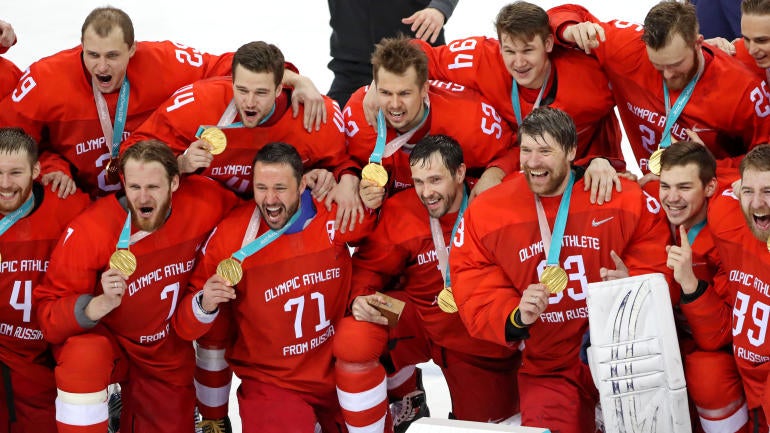After a quarterfinal that saw Team USA fall in a shootout to the Czech Republic and semifinals where the defending champion Canadians went down at the hands of Germany, which used two overtime wins of its own to get there, it was only right that the gold medal game for men's ice hockey at the 2018 Winter Olympics could not conclude in regulation.
At a Winter Games with seemingly as many political stories as athletic ones, it was also inevitable that Russia, a country that, on paper, had already been banned from Olympics participation for two months, would benefit from that.
And that's exactly what happened on Sunday -- Saturday night in South Korea -- when the Olympic Athletes from Russia (OAR), a team playing for recognition that won't ever officially be credited to Russia thanks to highly publicized doping sanctions, took home hockey's top international prize, edging Germany, 4-3, in overtime to close the 2018 men's ice hockey tournament.
Germany had a heroic run of its own leading up to Saturday's title clash, besting a unit in Canada that owned three of the previous four Winter Olympic gold medals against all odds, and it nearly discarded of the favored Russians as well.
After a last-second goal from OAR's Slava Voynov, a former Los Angeles Kings player in the NHL, in the game's first period, Germany didn't fold under increased pressure from a Russian lineup that was built to succeed in a tournament without any active NHL stars, tying the contest 2-2 in the second and going ahead 3-2 on a score from Jonas Muller with three minutes remaining.
But OAR, with Kontinental Hockey League standouts like Kirill Kaprizov and Ilya Kovalchuk leading the charge, was even more relentless, chipping away at Germany's conservative approach throughout regulation and throwing the tournament finale into a tizzy with a clutch-time score by 25-year-old Nikita Gusev, a former Tampa Bay Lightning draft pick.
On the verge of securing gold with its 3-2 lead, Germany went on a power play in the waning minutes of the final, but Russia then went bold by pulling goalie Vasili Koshechkin from the net, setting up a 5-on-5 and, in a highlight that will live on in Olympic history, sending the game to overtime with a shot by Gusev.
Koshechkin, who joined teammate Bogdan Kiselevich in accidentally pushing the puck into his own net on an earlier score by Germany, held firm in the subsequent OT stretch, and when OAR got a power-play try of its own, this one induced by high-sticking to 39-year-old "Magic Man" Pavel Datsyuk, it capitalized with the puck. Kaprizov getting one past German goalie Danny Aus Birken roughly 15 minutes into the period then put a thrilling touch on the matchup, bringing hockey gold to Russian athletes for the first time since 1992.
Germany didn't leave empty-handed despite the heartbreaking finish, claiming silver just four years after the country didn't even qualify for men's ice hockey at the 2014 Sochi Games. And yet it was Russia, in all the glory of its International Olympic Committee-imposed neutral uniforms, that truly stole the show.
On the same day the IOC voted to uphold Russia's ban from the Closing Ceremony in Pyeongchang, OAR retained at least some honor for its country, going blow for blow with -- and ultimately topping -- the tourney's top underdog story.
Russia had initially been barred from the Olympics in December after a years-long investigation into an alleged state-backed doping program, which enabled hundreds of athletes to use performance-enhancing drugs at previous Games. Hundreds of the country's representatives were still granted "special dispensation" to compete in South Korea, albeit under the "OAR" moniker and without any official ties to Russia. Even during the 2018 Olympics, though, at least two of OAR's athletes have either forfeited medals, which would not have been credited to the country anyway, or drawn international scorn for failing additional drug tests.

